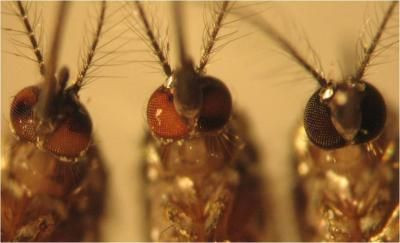Mutant Mosquito Genome Alteration Changes Eye Color, Can Fight Dengue Fever

A mutant mosquito genome developed by Virginia Tech scientists could be a major step towards fighting mosquito-borne illnesses like dengue fever with genetic alterations.
The groundbreaking researchers used a gene disruption technique to change the color of mosquitoes' eyes- a feat that paves the way for more advanced genome alterations that can neutralize the pests' disease-carrying abilities.
The study, published today in journal PLOS One, was led by Virginia Tech entomology researchers Zach Adelman and Kevin Myles.
The researchers used a pair of engineered proteins to cut DNA out a specific gene and create a mutant mosquito genome. The transcription activator-like effector nuclease proteins, abbreviated as TALENS, were hailed as a major scientific breakthrough last year by Science magazine, which called them "genomic cruise missiles" because they can so quickly and efficiently target specific genetic locations.
The Virginia Tech scientists were the first to use TALENS to edit the mosquito genome of Aedes aegypti, the species most responsible for spreading diseases like dengue fever and Chikungunya.
As a specific test for their ability to genetically alter mosquito characteristics, they designed a pair of TALENS to target a gene whose protein affects the pigmentation of Aedes aegypti mosquitoes' eyes. The researchers used TALENS to edit mosquito genomes early in development, and were able to successfully change the next generation of mosquitoes' eyes from black to white.
The success of the mutant mosquito genome makes it much easier for researchers to investigate the genetic basis of behaviors like blood-feeding and host-seeking, which critically affect disease virus transmission.
"To date, efforts to control dengue transmission through genetics have focused entirely on adding material to the mosquito genome. Ensuring that this added material is expressed properly and consistently has been a challenge," Adelman said in a statement.
"This technology allows us to pursue the same goals, namely, the generation of pathogen-resistant mosquitoes, through subtraction. For example, removing or altering a gene that is critical for pathogen replication."
Dengue fever, which is making a comeback in the United States, is difficult to fight with vaccines or drugs. The researchers believe that genetically altering the disease-carrying mosquitoes is among the most promising targets for controlling its spread.
Genetically modifying and releasing mutant mosquitoes as a form of pest control is controversial. Critics of previous research on mosquito genome alteration worry that mutant mosquitoes might stay alive longer than intended, and have unexpected environmental consequences.
It's possible that viruses like dengue fever could simply evolve past genetic obstacles and become even more difficult to control, or that decimating a local disease-carrying mosquito population could create an ecological void for other harmful pests.
Still, scientists are hopeful about the potential public health impact of editing mutant mosquito genomes.
"A better understanding of how the virus infects the mosquito and other biological properties of the insect will be required to develop intervention strategies that can block virus transmission by the mosquito," said George Dimopoulos, a molecular microbiology professor at John Hopkins University.
"The ability to genetically engineer mosquitoes is essential for the study of such biological functions."



























